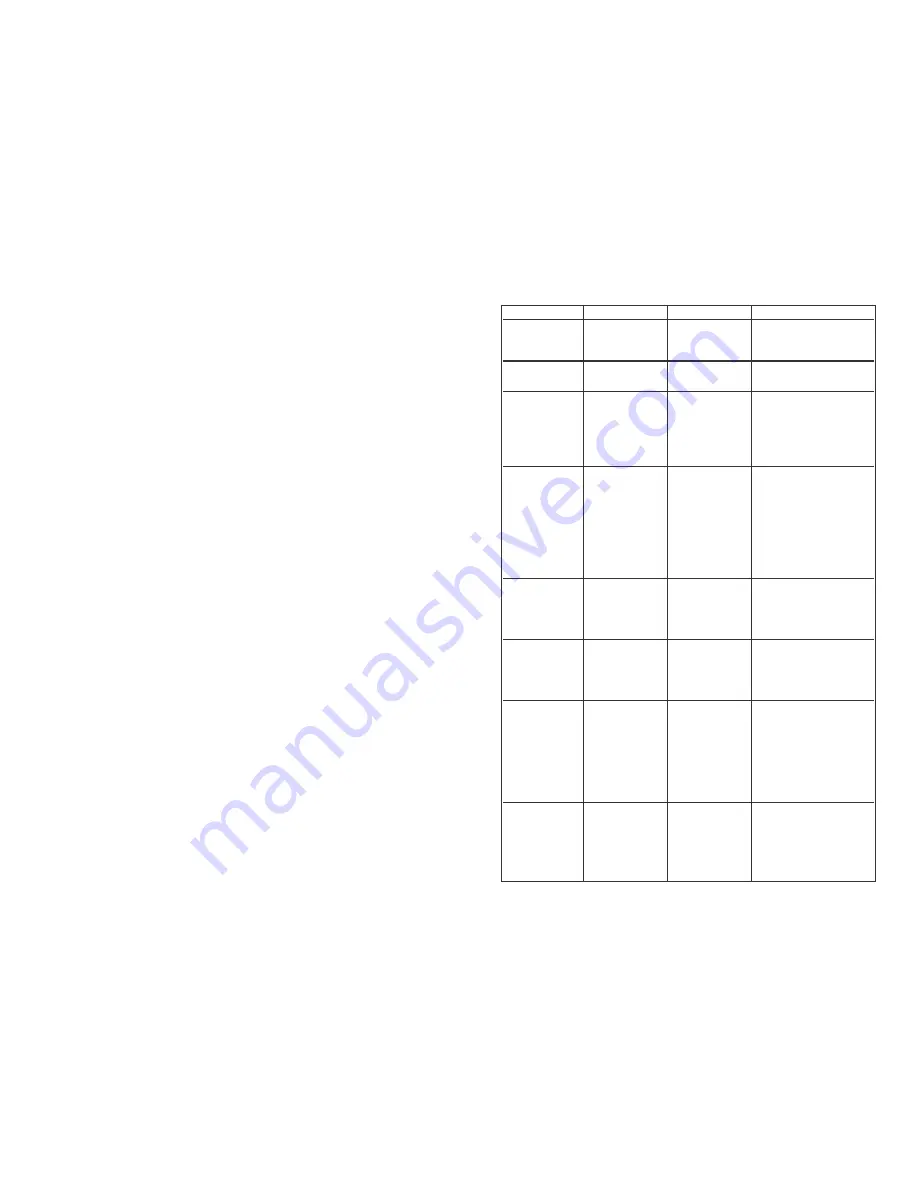
10
9
Cleaning and Maintenance
Any piece of equipment works better and lasts longer when maintained
properly and kept clean. Cooking equipment is not exception. Your ap-
pliance must be kept clean and maintained properly.
Porcelain Parts
Wash with warm soapy water.
Do not use
steel wool, abrasive cleansers,
ammonia, or acids which may damage the finish.
Glass Ceramic (If Applicable)
Cleaning of glass ceramic tops is different from cleaning a standard porce-
lain finish. To maintain and protect the surface of your glass ceramic top,
follow these basic steps:
For normal light soil:
Rub a few drops of a glass ceramic creame to the cool soiled area using
a damp paper towel. Wipe until all soil and cream are removed. Frequent
cleaning leaves a protective coating which is essential in preventing
scratches and abrasions.
For heavy, burned soil:
1. Apply a few drops of glass ceramic cleaning creame to the cool
soiled area.
2. Using a damp paper towel, rub creame into burned on area.
3. Carefully scrape remaining soil with a razor scraper. Hold the scraper
at a 30° angle against the ceramic surface.
4. If any soil remains, repeat the steps listed above. For additional pro-
tection, after all soil has been removed, polish the entire surface with
the cleaning creame.
5. Buff with a dry paper towel. As the cleaning creame cleans, it leaves
a protective coating on the glass surface. This coating helps to pre-
vent build-up of mineral deposits (water spots) and will make future
cleaning easier. Dishwashing detergents remove this protective coat-
ing and therefore make the glass ceramic top more susceptible to
staining.
Problem
Cause
To Prevent
To Remove
Brown streaks and
Cleaning with sponge Use cleaning creame Use a light application of
specks
or cloth containing
with clean damp
cleaning creame with a clean
soil-laden detergent
paper towel
damp paper towel
Fine brown/gray
Coarse particles (salt
Wipe the bottom of
Fine scratches are not removable
water
Blackened burned
Spatters or spillovers Wipe all spillovers as Clean area with cleaning creame
on spots
onto a hot cooking
soon as it is safe and
and a damp paper towel, non-
area or accidental
to not put plastic
abrasive nylon pad or scouring
melting of a plastic
items on a warm
brush. If burn-on is not removed,
film, such as a bread
cooking area
cool unit, and carefully scrape
area with a single edged razor
blade held at a 30
o
angle.
Fine brown/gray
Coarse particles (salt
Wipe the bottom of
Fine scratches are not removable
lines or fine scratches sugar) can get caught cookware before
but can be minimized by daily
or abrasions which
on the bottom of
cooking. Clean top
use of cleaning creame.
have collected soil
cookware and
daily with cleaning
become embedded
creame. Do not use
into top. Using
ceramic or ceramic
abrasive cleaning
coated cookware.
materials. Scratches
from rough ceramic
glass, or ceramic
coated cookware.
Smearing or
Use of too much
Use a small amount
Dampen paper towel with a
streaking
cleaning creame
of creame. Rinse
mixture of vinegar and water
or use of a soiled
throughly before
and wipe surface. Wipe area
dishcloth
drying. Use only
with damp paper towel and dry
paper towels or nylon with a paper towel or lint free
scrub pad or brush.
cloth.
Metal markings
Sliding or scraping
Do not slide metal
Remove metal marks before the
silver/gray marks
metal utensils on
objects across top
glasstop is used again. Apply
glasstop
cleaning creame with a damp
paper towel and scrub with a
nylon scrub pad or brush. Rinse
thoroughly and dry.
Hard water spots
Condensation from
Make sure the bottom Mix cleaning creame with water
cooking may cause
of utensils are dry
and apply a thick paste to
minerals found in
before cooking.
stained area. Scrub vigorously.
water and acids to
Daily use of cleaning
If stain is not removed, reapply
to drip on glasstop
creame will help keep cleaner and repeat process.
and cause gray
top free from hard
Also try cleaning procedure for
deposts. The spots
water mineral
smearing and streaking.
are often so thin they deposits and food
appear to be in or
discoloration
the glasstop.
Pitting or flaking
Boil over of sugar
Watch sugar and
Turn element to LO; using
syrup on glasstop.
syrups carefully to
several paper towels to wipe the
This can cause
avoid boilovers.
spill immediately. Let glasstop
pitting if not
cool and carefully scrape off
removed
remainder of burn-off with a
immediately
single edged razor held at a 30
o
angle.
Cleaning Problems on Glass Ceramic Top
Summary of Contents for F20333A
Page 8: ...15 16...


























